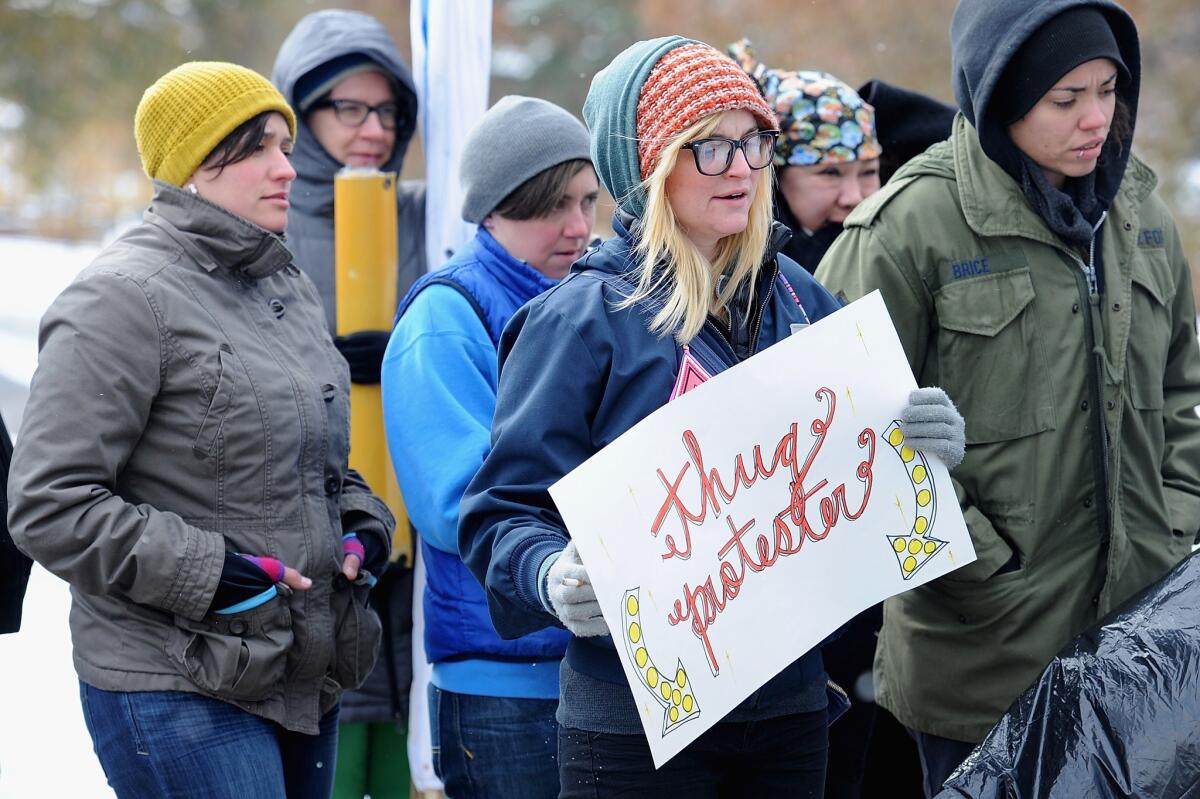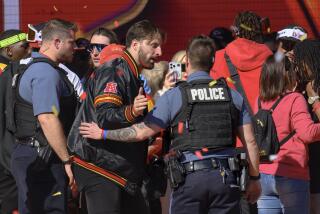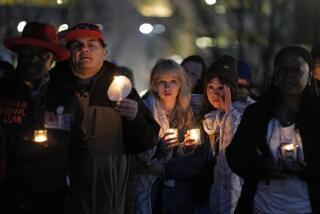Missouri governor activates National Guard, declares state of emergency

- Share via
Missouri Gov. Jay Nixon activated the state’s National Guard on Monday and declared a state of emergency in anticipation of a grand jury decision on whether to indict Ferguson Police Officer Darren Wilson in the shooting death of Michael Brown.
“My hope and expectation is that peace will prevail. But I have a responsibility to plan for any contingency that might arise,” Nixon said during an evening news briefing.
Nixon said National Guard troops would support local police, securing the command center and stations. He would not say how many troops would be deployed or how soon they would hit the streets.
Under the executive order, a “unified command” of three police agencies — the State Highway Patrol and St. Louis city and county police — will coordinate the response, with county police responsible for securing Ferguson protest areas. Ferguson police will not be part of the response but will continue to answer “routine calls,” Nixon said.
“Everything we’re doing is being driven by the dual objectives, what I call the ‘dual pillars’: keeping the public safe while allowing them to speak,” said Nixon, a Democrat. “Our goal here is to keep the peace and allow folks’ voices to be heard.”
The St. Louis County prosecutor expects the grand jury’s decision this month. The Justice Department is also investigating Brown’s death and the Ferguson Police Department, but has not announced when its inquiries will conclude.
Local police chiefs praised the decision to call in the National Guard, which Nixon also activated during protests after Brown’s death Aug. 9.
“Having the support of the National Guard available will enable local officers to continue to respond promptly to calls for service,” St. Louis Metropolitan Police Chief Sam Dotson said in a statement Monday.
Police agencies across the St. Louis area have been arming themselves and training for the potential of a violent backlash in the streets after the grand jury decision.
“We have taken tremendous strides over the past three months, as our officers have undergone thousands of hours of additional training and reached out to build strong relationships across the community,” St. Louis County Police Chief Jon Belmar said Monday.
Some local officials said they were grateful to see the National Guard called up.
“It’s necessary,” said Patrick Green, mayor of Normandy, a St. Louis suburb just south of Ferguson. “You have to do the prudent thing. You can’t call them at the last minute.”
Green, president of the state’s African American mayors’ group, said local police were trying to protect protesters, not squelch their free speech.
“It’s about safety. There are people who will mingle themselves in with the peaceful protesters who don’t have a peaceful intention,” Green said. “The community has to be prepared for that.”
Some residents and business owners are arming themselves.
Adam Weinstein, owner of County Guns, which serves the Ferguson area, made more sales during the last three months than he did last year. Other local gun dealers said they had benefited from similar spikes.
Classes for first-time gun owners and those seeking concealed handgun licenses are packed, some booked through January.
Many of Weinstein’s customers said they were buying guns because they were afraid what might happen when the grand jury announces its decision, and they wanted to protect their families.
“We’re expecting things to get really bad,” he said.
Weinstein moved his gun shop from West Florissant Avenue in Ferguson, the epicenter of the protests, to nearby Bridgeton last summer after he had to hole up inside and defend it from looters following the Brown shooting.
He said racial tensions in the area had become palpable.
“It’s about to boil over. Unfortunately, this is going to be the catalyst. It’s been a long time coming. That’s why most of us are in fear — it’s been building for a while,” Weinstein said.
He wasn’t sure what he would do after the findings were released.
“I’ve heard people are going to hole up at their businesses like we did, armed to the teeth. I’ve heard people are going to leave town and hide. I’ve heard people are going to hide at home,” Weinstein said.
He worried how other Ferguson-area businesses would fare after the grand jury decision if the region became mired in more clashes during holiday shopping season.
“The economic impact is going to be huge,” he said.
Some protest organizers disagreed.
“Law enforcement has been hyping everything — buying all this equipment, assuming there’s going to be all this violence — but most of the past 90 days have been nonviolent. Most of the time there has been an escalation of violence, that has come from police overreaction,” said Michael McPhearson, interim executive director of Veterans for Peace, one of the groups organizing protests.
“Gov. Nixon and the leadership, instead of trying to de-escalate people’s fears, they have made it worse. They act as if we’re a foreign force and we’re coming in with weapons and they’ve seen us training somewhere with tactics to destroy the city. And that’s just totally absurd,” McPhearson said. “The idea that there’s some sort of secret training going on to fight the police doesn’t make any sense. It’s just fear.”
McPhearson said his group had been setting up safe spaces for protesters to retreat to near “hot zones” such as West Florissant, and was trying to work with police to develop “professional best practices in terms of not getting in the way of people expressing their constitutional rights.”
molly.hennessy-fiske@latimes.com
Twitter: @mollyhf
More to Read
Sign up for Essential California
The most important California stories and recommendations in your inbox every morning.
You may occasionally receive promotional content from the Los Angeles Times.














